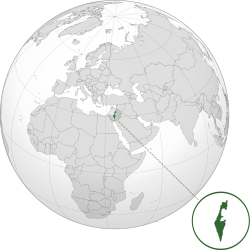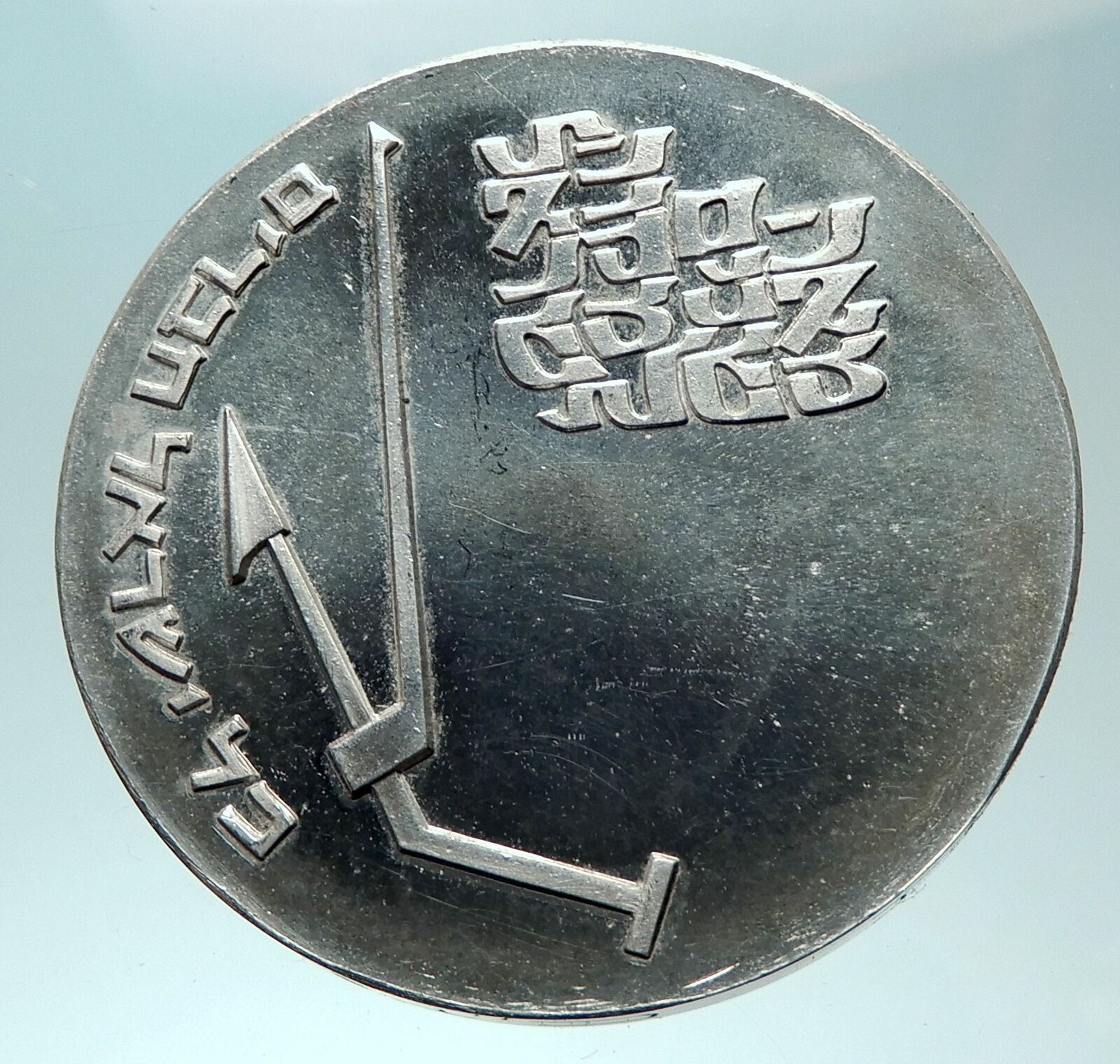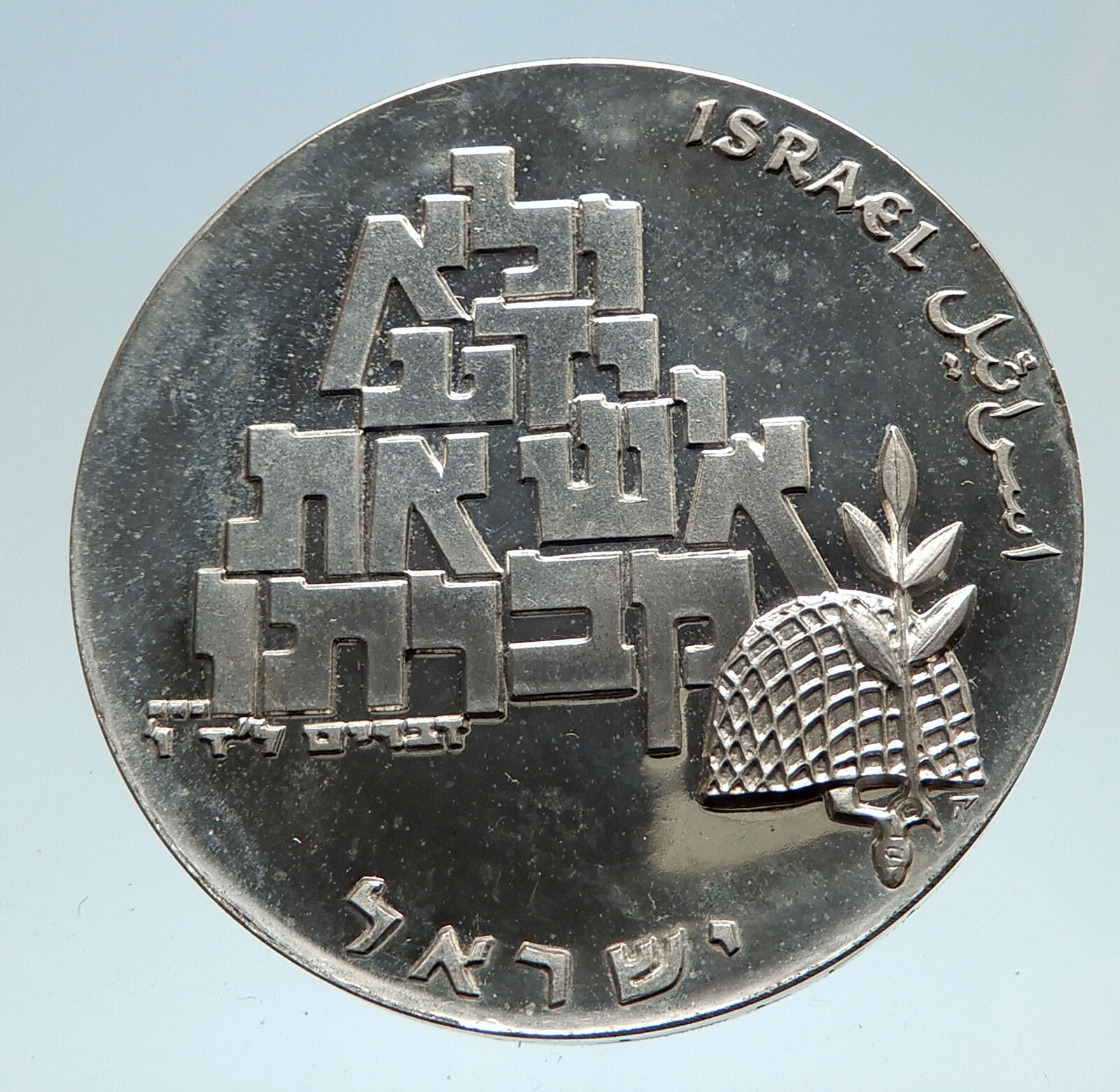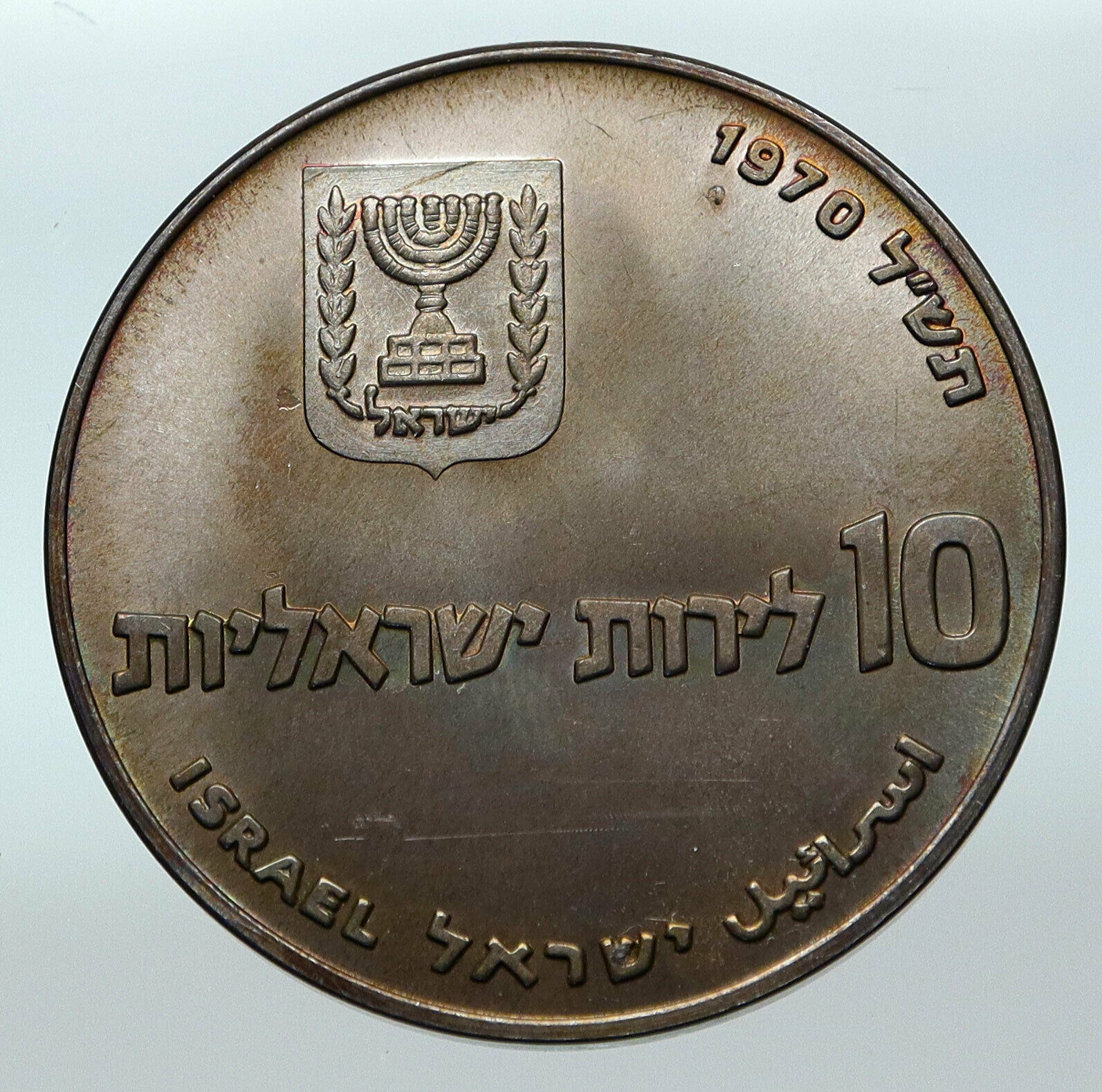|
Israel
22nd Anniversary of Independence – Centennial of Mikveh Israel
1970 Silver 10 Lirot 37mm (26.00 grams) 0.900 Silver (0.7523 oz. ASW)
Reference: KM# 55
اسرائيل תשי׳׳ח 1970 10 לירות ישראליות, Value and text swithin articstic design.
ישראל , Mikveh Israel Centenary.
Edge Lettering in Hebrew and Arabic.
You are bidding on the exact item pictured, provided with a Certificate of Authenticity and Lifetime Guarantee of Authenticity.
 Mikveh Israel (Hebrew: מִקְוֵה יִשְׂרָאֵל, lit. ‘Hope of Israel’) is a youth village and boarding school in central Israel, established in 1870. It was the first Jewish agricultural school in what is now Israel. Located in Tel Aviv District, it had a population of 432 in 2017. Mikveh Israel (Hebrew: מִקְוֵה יִשְׂרָאֵל, lit. ‘Hope of Israel’) is a youth village and boarding school in central Israel, established in 1870. It was the first Jewish agricultural school in what is now Israel. Located in Tel Aviv District, it had a population of 432 in 2017.
History
Mikveh Israel was founded in April 1870 by Charles Netter, an emissary of the French organization Alliance Israélite Universelle, aiming to be an educational institution where young Jews could learn agriculture and leave to establish villages and settlements all over the country and to make the desert blossom. It was established on a tract of land southeast of Jaffa leased from the Ottoman Sultan, who allocated 750 acres (3.0 km2) to the project. The name is taken from two passages in the Book of Jeremiah, Jeremiah 14:8 and 17:13, and was proposed by Wolf Grinstein, one of the school’s first students, who later taught there.
Netter, the first headmaster, introduced new methods of agricultural training, with Baron Edmond James de Rothschild contributing to the upkeep of the school. Netter pioneered progressive educational methods and a new way of life and agricultural training to the future farmers of this land. There were only about 20,000 Jews in the country at that time, mostly established in the traditional cities of Judaism: Jerusalem, Tiberias, Safed and Hebron.
In 1898, Theodor Herzl met the German Emperor Wilhelm II at the main entrance of Mikveh Israel during Herzl’s only visit to Eretz Yisrael. The meeting, a PR event engineered by Herzl to publicly meet the Kaiser, was misinterpreted by the world media as a legitimization of Herzl and Zionism by Germany. Today, entrance to the school grounds is via the city of Holon.
For many decades (until the establishment of the Volcani Center and the Faculty of Agriculture in Rechovot) the school served as the research center for the country. Their teachers wrote the first study books about agriculture and served as field advisors. Most of the agricultural know-how of the first 50 years was collected and published by Mikve Israel. After finishing their studies, the thousands of graduates left Mikve Israel to start agricultural settlements of all kinds, villages and kibbutzim, moshavim, farms and agricultural schools; or serving in management positions; or continued their agricultural studies in institutions of higher learning and filling positions in research and development, the export branches, marketing and agricultural management.
In 1938-1939, at the request of the Youth Aliyah, a section for religious youth was built to house the religious and traditional youngsters who fled western Europe just before the start of the Holocaust.
Education
The village has about 1,800 pupils from the age of 12 to the age of 18; 800 in the General section, 320 in the religious school, 380 in the French-Israeli college and high school. Around 280 students are boarders and the site also hosts four Montessori and holistic pedagogy kindergartens, and a Montessori elementary school.
In 2007 Mikve Israel and the Alliance Israélite Universelle inaugurated an experimental bilateral Israel-France high school, with half of its pupils studying for the French Baccalauréat and half for Israeli Bagrut.
Agriculture
The agricultural grounds of Mikve Israel cover over 2,200 dunams (out of a general area of 3,300 dunams). Most of the fields are irrigated using wells and include field crops, industrial crops, vegetables, fruit trees, orange groves and greenhouses. The school also raises animals including milk cows, chickens and honey bees, as well as having auxiliary branches including computerized agriculture.
One dunam (0.1 hectares) is covered by greenhouses. The aim of the greenhouse production branch is to teach students and allow them to research greenhouse issues and technologies. A rainwater harvesting system allows efficient re-use of water collected from the roof for growing of vegetables in greenhouses.
Gardening and landscaping activity over 100 dunams (10 hectares) includes woods, lawns and beauty & leisure gardens and spots throughout the village. The gardening and landscaping is maintained by the students supervised and coached by the manager of this production branch.
The botanical garden was established in 1930 in order to adapt and acclimate trees and species to the Israeli climate. Plants were imported from all over the world. It now covers now 70 dunams (7 hectares).
The dairy farm covers as genetics, computers, milking parlor and cooling, product quality control, feeding, herd health, udder health, artificial insemination and embryo transfer and implants.
The stable has the following breeds of riding horses: Hanoverian, Holland and quarter-horse breeds suited to all types of horseback riding: western, sports, and therapeutic riding.
 Israel (/ˈɪzriəl, ˈɪzreɪəl/; Hebrew: יִשְׂרָאֵל; Arabic: إِسْرَائِيل), officially the State of Israel, is a country in the Middle East, on the southeastern shore of the Mediterranean Sea and the northern shore of the Red Sea. It has land borders with Lebanon to the north, Syria to the northeast, Jordan on the east, the Palestinian territories of the West Bank and Gaza Strip to the east and west, respectively, and Egypt to the southwest. The country contains geographically diverse features within its relatively small area. Israel’s economic and technological center is Tel Aviv, while its seat of government and proclaimed capital is Jerusalem, although the state’s sovereignty over Jerusalem has only partial recognition. Israel (/ˈɪzriəl, ˈɪzreɪəl/; Hebrew: יִשְׂרָאֵל; Arabic: إِسْرَائِيل), officially the State of Israel, is a country in the Middle East, on the southeastern shore of the Mediterranean Sea and the northern shore of the Red Sea. It has land borders with Lebanon to the north, Syria to the northeast, Jordan on the east, the Palestinian territories of the West Bank and Gaza Strip to the east and west, respectively, and Egypt to the southwest. The country contains geographically diverse features within its relatively small area. Israel’s economic and technological center is Tel Aviv, while its seat of government and proclaimed capital is Jerusalem, although the state’s sovereignty over Jerusalem has only partial recognition.

Israel has evidence of the earliest migration of hominids out of Africa. Canaanite tribes are archaeologically attested since the Middle Bronze Age, while the Kingdoms of Israel and Judah emerged during the Iron Age. The Neo-Assyrian Empire destroyed Israel around 720 BCE. Judah was later conquered by the Babylonian, Persian and Hellenistic empires and had existed as Jewish autonomous provinces. The successful Maccabean Revolt led to an independent Hasmonean kingdom by 110 BCE, which in 63 BCE however became a client state of the Roman Republic that subsequently installed the Herodian dynasty in 37 BCE, and in 6 CE created the Roman province of Judea. Judea lasted as a Roman province until the failed Jewish revolts resulted in widespread destruction, expulsion of Jewish population and the renaming of the region from Iudaea to Syria Palaestina.[34] Jewish presence in the region has persisted to a certain extent over the centuries. In the 7th century the Levant was taken from the Byzantine Empire by the Arabs and remained in Muslim control until the First Crusade of 1099, followed by the Ayyubid conquest of 1187. The Mamluk Sultanate of Egypt extended its control over the Levant in the 13th century until its defeat by the Ottoman Empire in 1517. During the 19th century, national awakening among Jews led to the establishment of the Zionist movement in the diaspora followed by waves of immigration to Ottoman and later British Palestine.
 In 1947, the United Nations adopted a Partition Plan for Palestine recommending the creation of independent Arab and Jewish states and an internationalized Jerusalem. The plan was accepted by the Jewish Agency, and rejected by Arab leaders. The following year, the Jewish Agency declared the independence of the State of Israel, and the subsequent 1948 Arab-Israeli War saw Israel’s establishment over most of the former Mandate territory, while the West Bank and Gaza were held by neighboring Arab states. Israel has since fought several wars with Arab countries, and it has since 1967 occupied territories including the West Bank, Golan Heights and the Gaza Strip (still considered occupied after 2005 disengagement, although some legal experts dispute this claim).[41][42][43][fn 4] It extended its laws to the Golan Heights and East Jerusalem, but not the West Bank. Israel’s occupation of the Palestinian territories is the world’s longest military occupation in modern times.[fn 4][49] Efforts to resolve the Israeli-Palestinian conflict have not resulted in a final peace agreement. However, peace treaties between Israel and both Egypt and Jordan have been signed. In 1947, the United Nations adopted a Partition Plan for Palestine recommending the creation of independent Arab and Jewish states and an internationalized Jerusalem. The plan was accepted by the Jewish Agency, and rejected by Arab leaders. The following year, the Jewish Agency declared the independence of the State of Israel, and the subsequent 1948 Arab-Israeli War saw Israel’s establishment over most of the former Mandate territory, while the West Bank and Gaza were held by neighboring Arab states. Israel has since fought several wars with Arab countries, and it has since 1967 occupied territories including the West Bank, Golan Heights and the Gaza Strip (still considered occupied after 2005 disengagement, although some legal experts dispute this claim).[41][42][43][fn 4] It extended its laws to the Golan Heights and East Jerusalem, but not the West Bank. Israel’s occupation of the Palestinian territories is the world’s longest military occupation in modern times.[fn 4][49] Efforts to resolve the Israeli-Palestinian conflict have not resulted in a final peace agreement. However, peace treaties between Israel and both Egypt and Jordan have been signed.
In its Basic Laws, Israel defines itself as a Jewish and democratic state. Israel is a representative democracy[neutrality is disputed] with a parliamentary system, proportional representation and universal suffrage. The prime minister is head of government and the Knesset is the legislature. Israel is a developed country and an OECD member, with the 32nd-largest economy in the world by nominal gross domestic product as of 2017. The country benefits from a highly skilled workforce and is among the most educated countries in the world with one of the highest percentages of its citizens holding a tertiary education degree. Israel has the highest standard of living in the Middle East, and has one of the highest life expectancies in the world.
|





 Mikveh Israel (Hebrew: מִקְוֵה יִשְׂרָאֵל, lit. ‘Hope of Israel’) is a youth village and boarding school in central Israel, established in 1870. It was the first Jewish agricultural school in what is now Israel. Located in Tel Aviv District, it had a population of 432 in 2017.
Mikveh Israel (Hebrew: מִקְוֵה יִשְׂרָאֵל, lit. ‘Hope of Israel’) is a youth village and boarding school in central Israel, established in 1870. It was the first Jewish agricultural school in what is now Israel. Located in Tel Aviv District, it had a population of 432 in 2017.  Israel (/ˈɪzriəl, ˈɪzreɪəl/; Hebrew: יִשְׂרָאֵל; Arabic: إِسْرَائِيل), officially the State of Israel, is a country in the Middle East, on the southeastern shore of the Mediterranean Sea and the northern shore of the Red Sea. It has land borders with Lebanon to the north, Syria to the northeast, Jordan on the east, the Palestinian territories of the West Bank and Gaza Strip to the east and west, respectively, and Egypt to the southwest. The country contains geographically diverse features within its relatively small area. Israel’s economic and technological center is Tel Aviv, while its seat of government and proclaimed capital is Jerusalem, although the state’s sovereignty over Jerusalem has only partial recognition.
Israel (/ˈɪzriəl, ˈɪzreɪəl/; Hebrew: יִשְׂרָאֵל; Arabic: إِسْرَائِيل), officially the State of Israel, is a country in the Middle East, on the southeastern shore of the Mediterranean Sea and the northern shore of the Red Sea. It has land borders with Lebanon to the north, Syria to the northeast, Jordan on the east, the Palestinian territories of the West Bank and Gaza Strip to the east and west, respectively, and Egypt to the southwest. The country contains geographically diverse features within its relatively small area. Israel’s economic and technological center is Tel Aviv, while its seat of government and proclaimed capital is Jerusalem, although the state’s sovereignty over Jerusalem has only partial recognition.
 In 1947, the United Nations adopted a Partition Plan for Palestine recommending the creation of independent Arab and Jewish states and an internationalized Jerusalem. The plan was accepted by the Jewish Agency, and rejected by Arab leaders. The following year, the Jewish Agency declared the independence of the State of Israel, and the subsequent 1948 Arab-Israeli War saw Israel’s establishment over most of the former Mandate territory, while the West Bank and Gaza were held by neighboring Arab states. Israel has since fought several wars with Arab countries, and it has since 1967 occupied territories including the West Bank, Golan Heights and the Gaza Strip (still considered occupied after 2005 disengagement, although some legal experts dispute this claim).[41][42][43][fn 4] It extended its laws to the Golan Heights and East Jerusalem, but not the West Bank. Israel’s occupation of the Palestinian territories is the world’s longest military occupation in modern times.[fn 4][49] Efforts to resolve the Israeli-Palestinian conflict have not resulted in a final peace agreement. However, peace treaties between Israel and both Egypt and Jordan have been signed.
In 1947, the United Nations adopted a Partition Plan for Palestine recommending the creation of independent Arab and Jewish states and an internationalized Jerusalem. The plan was accepted by the Jewish Agency, and rejected by Arab leaders. The following year, the Jewish Agency declared the independence of the State of Israel, and the subsequent 1948 Arab-Israeli War saw Israel’s establishment over most of the former Mandate territory, while the West Bank and Gaza were held by neighboring Arab states. Israel has since fought several wars with Arab countries, and it has since 1967 occupied territories including the West Bank, Golan Heights and the Gaza Strip (still considered occupied after 2005 disengagement, although some legal experts dispute this claim).[41][42][43][fn 4] It extended its laws to the Golan Heights and East Jerusalem, but not the West Bank. Israel’s occupation of the Palestinian territories is the world’s longest military occupation in modern times.[fn 4][49] Efforts to resolve the Israeli-Palestinian conflict have not resulted in a final peace agreement. However, peace treaties between Israel and both Egypt and Jordan have been signed. 




